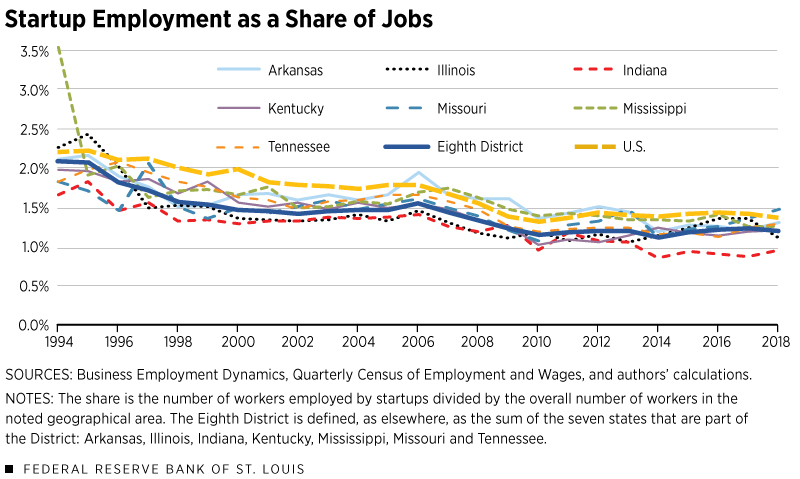Startups Account for Smaller Share of U.S. Jobs

Success stories such as Facebook, Amazon and Google show that a startup has the potential to become a big employer. But how important are startups to the U.S. labor market when they’re still young firms? Across a swath of industries, startup companies are hiring proportionally fewer workers compared with older companies, according to a recent Regional Economist article.
Economist Sungki Hong and Research Associate Devin Werner analyzed startups’ share of U.S. employment from 1994 to 2018. To do this, they used Business Employment Dynamics, a program of the Bureau of Labor Statistics.Startups are defined as firms less than one year old that were issued an employer identification number by the IRS.
Startup Employment Nationally
Hong and Werner found that startups’ share of employment has declined. Nationally, startup employment represented 2.2% of employeesNumbers of employees are counted based on firm-reported filled jobs, whether full- or part-time and temporary or permanent. A single individual holding multiple jobs could be counted multiple times in the data. in 1994, but that number had slipped to 1.4% by 2018.
The 2007-2009 financial crisis accelerated the drop in the startup share of employment, but the share since then—while still lower than in 1994—has been relatively stable, they noted.
Startup Employment in the Eighth District
A similar pattern holds in each of the seven states of the Eighth District.This analysis encompassed the totality of the seven states in the Eighth District: Arkansas, Illinois, Indiana, Kentucky, Mississippi, Missouri and Tennessee. Startups represented 2.1% of jobs in 1994 but only 1.2% in 2018, the authors noted, adding that this share declined in every District state.

Trend Holds across Industries
Hong and Werner then took industry-level data to determine if this pattern was due to a particular industry. They selected four industries to examine: construction, leisure and hospitality, information, and manufacturing. The authors found that startups in all four industries accounted for a declining share of employment.
Nationally, construction startups accounted for 4.4% of employment but slid to 1.9%. Likewise, the share of employment from manufacturing startups declined from 1.0% to 0.4%. A similar trend occurred with those four industries located in Eighth District states as well, Hong and Werner noted.
Notes and References
1 Startups are defined as firms less than one year old that were issued an employer identification number by the IRS.
2 Numbers of employees are counted based on firm-reported filled jobs, whether full- or part-time and temporary or permanent. A single individual holding multiple jobs could be counted multiple times in the data.
3 This analysis encompassed the totality of the seven states in the Eighth District: Arkansas, Illinois, Indiana, Kentucky, Mississippi, Missouri and Tennessee.
Additional Resources
- Regional Economist: Trends in Startups’ Share of Jobs in the U.S. and Eighth District
- On the Economy: Which Firms Create More Jobs: Startups or Older Firms?
- On the Economy: The Financial Challenges of Startups
Citation
ldquoStartups Account for Smaller Share of U.S. Jobs,rdquo St. Louis Fed On the Economy, June 23, 2020.
This blog offers commentary, analysis and data from our economists and experts. Views expressed are not necessarily those of the St. Louis Fed or Federal Reserve System.
Email Us
All other blog-related questions

